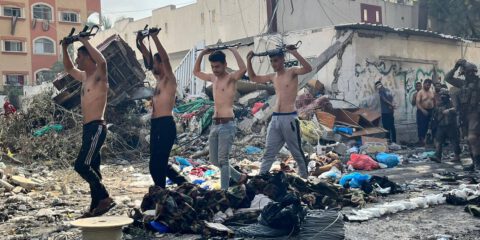An international trusteeship, UN-mandated forces, inter-Arab units, and military contingents from Western countries, will all object to Israel’s military freedom of action.
Hopefully, Israel will have enough time to achieve the goal of the war – the elimination of Hamas’s military infrastructure and the restoration of Israeli deterrence. Israel has no desire to stay in Gaza and take responsibility for its population. However, it wants to maintain military freedom of action to stem the growth of terrorist organizations in the Gaza area after its withdrawal.
A political vacuum in Gaza should not trouble Israel too much because it allows Israel military freedom of action. Yet, the Americans fear chaos, thereby insisting on discussing “the day after.” They dream of a stable government that will bring law and order to Gaza and engage in its rehabilitation with the help of large budgets from abroad. The Americans are ignoring their failures in “politically engineering” Muslim countries such as Afghanistan and Iraq after they were occupied by the American army for several years.
Remembering this American experience, and what is happening in Arab political entities such as Libya, Lebanon, Syria, Iraq, and Yemen, and even the Palestinian Authority (PA), building a political framework that will turn Gaza into Singapore or something less, is not an easy task to accomplish.
And Gaza is not Germany or Japan, modern states, whose values and political systems were changed to some extent by the American occupation. Therefore, the expectation that after Hamas rule in Gaza ends, a new regime will be able to maintain a monopoly on the use of force to prevent the growth of terrorist organizations and eliminate the Israeli need for military freedom of action in Gaza, is unrealistic.
An international trusteeship, UN-mandated forces, inter-Arab units, and military contingents from Western countries, will all object to Israel’s military freedom of action. Moreover, their top priority will be their own safety, and they will prefer to turn a blind eye to terrorist organizations whose goal is to harm Israel.
Israel’s experience with international forces is negative and their effectiveness in preventing terrorism is limited. When needed they disappear or interfere with IDF operations. Such forces would also be a source of tension with the countries whose troops would be stationed in Gaza. The PA, which the US has mentioned as an option to replace Hamas, is weak and its desire to defend Israel is questionable.
Restocking the weapons cache
UNFORTUNATELY, ISRAEL cannot ignore American preferences. The US is very important to Israel, especially after a war when its munitions stockpiles will be empty and will need to be filled. Israel will need the support of the US if it wants to initiate a large-scale attack on Hezbollah.
Therefore, Jerusalem should take Washington’s wishes into account. As part of the American obsession with the “two-state solution,” the Biden administration is trying to implement this paradigm by returning PA rule to Gaza to reunify the West Bank and Gaza as one political entity. Satisfying Washington on this issue is also important to prevent further radicalization of the Democratic Party’s position.
The alternative that will provide the greatest freedom of military action is counter-intuitively the introduction of the PA into Gaza. Its notorious weakness and inefficiency can become an advantage for Israel. The PA also has an interest in preventing the resurgence of Hamas. This is the cornerstone of security cooperation with Israel in the West Bank.
As in Judea and Samaria, the IDF will be the one that will have to do most of the work in Gaza. We should not expect too much resistance from the PA whose abilities are limited.
Regarding the issue of civil government, it is difficult to assume that the PA will function better in Gaza than in the West Bank. It will continue to be corrupt and ineffective. Perhaps a little of the large amount of money that will go to the reconstruction of Gaza will trickle down to the Gazans.
It can be assumed with a certain degree of certainty that the PA will fail in Gaza. Additional disappointment from the Palestinian national movement, the nemesis of the Zionist national movement, is beneficial for Israel. There is little chance that the Palestinians will give up their dreams unless there is a revolutionary change in the Palestinian education system.
A public opinion poll from the summer shows that two-thirds of Palestinians think that Israel will not celebrate the centenary of its independence. Perhaps another Palestinian failure will convince the world that this is a failed movement that does not deserve support.
The removal of Israeli opposition to the introduction of the PA into Gaza will also prove to the US that the Israeli government is not held captive by the extreme Right, which strongly opposes the transfer of Gaza to the PA.
Egypt, an important regional actor, is following with concern the war along its western border, and probably views the return of the PA to Gaza as a convenient solution. The PA is more amenable to Egyptian influence than the alternatives.
IN EXCHANGE for the removal of opposition to the PA’s rule in Gaza, Israel should demand the creation of buffer zones under its control in the North of Gaza (to distance it from the border settlements) and in the South (to reduce smuggling into Gaza from Sinai). These buffer zones and a strip parallel to the security barrier along the border should become kill zones to prevent access to Israeli targets.
The date of the IDF’s withdrawal from Gaza should be used as a bargaining leverage for attaining Israel’s goals there. The US would like to see an orderly IDF withdrawal to be replaced by a political arrangement of its sponsorship. The US needs Israeli cooperation in its quixotic attempt to bring stability and prosperity to Gaza. Israel should not oppose American diplomatic efforts, even though we know that after the withdrawal, the IDF will have to continue “mowing the grass” in Gaza.
This article was first published in The Jerusalem Post, November 15, 2023
JISS Policy Papers are published through the generosity of the Greg Rosshandler Family.
Photo: IMAGO / ABACAPRESS








 - בניית אתרים
- בניית אתרים